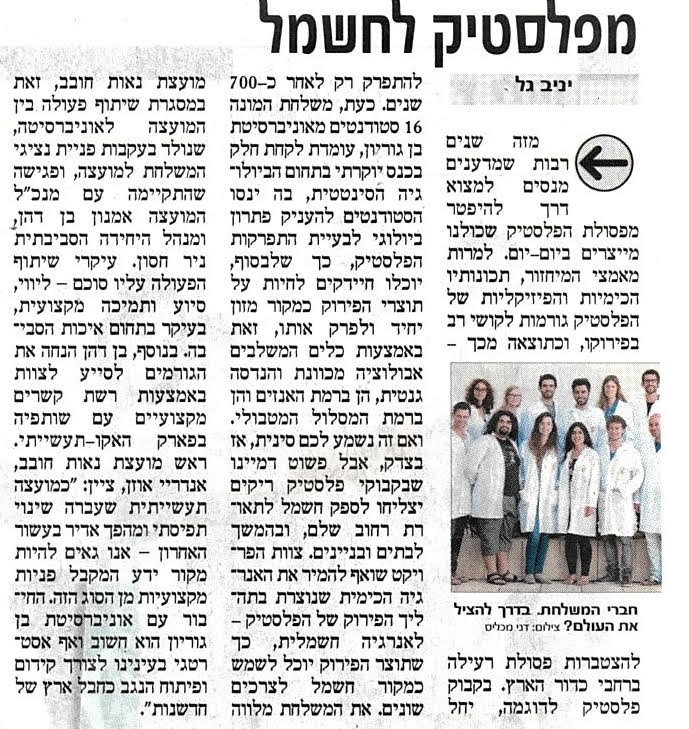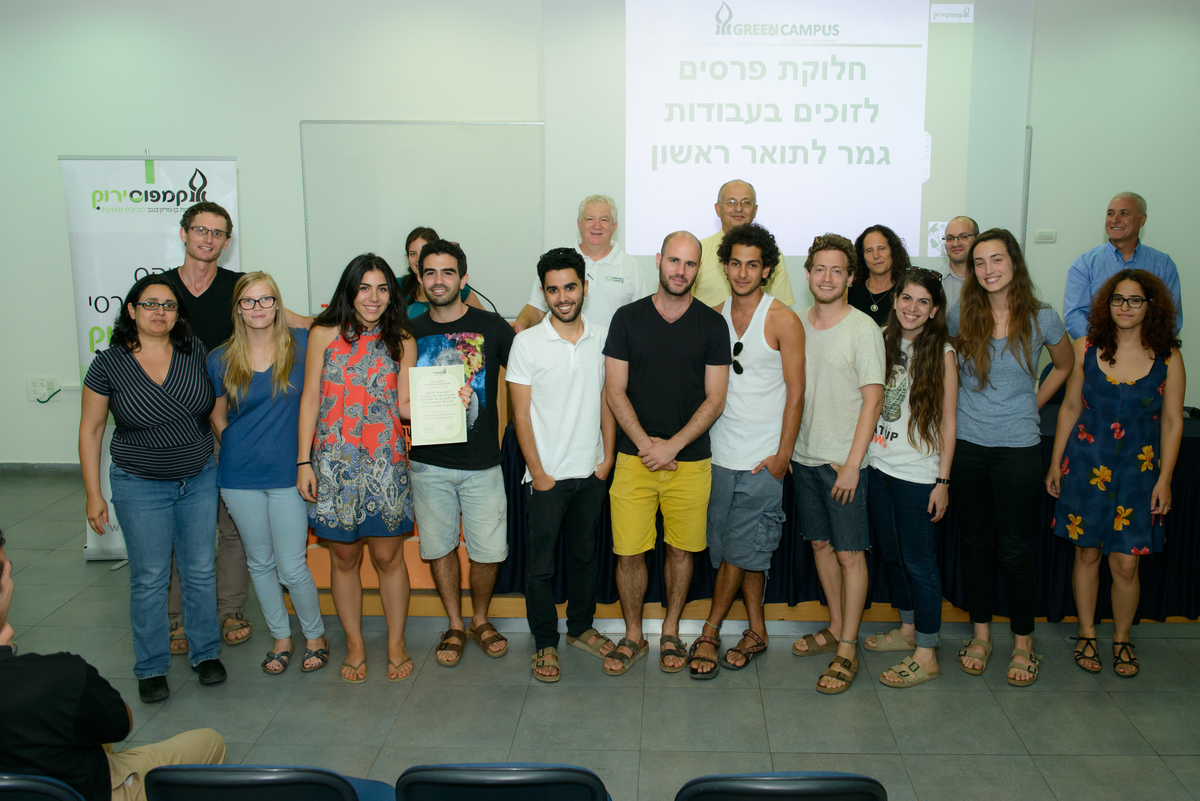Human Practices
PlastiCure team chose to focus on developing an effective solution for plastic pollution, a major environmental concern that holds a threat on the future existence of earth. Due to the destructive effects plastic has on the environment, we did not limit our effort only for synthetic biology solution. We took many measures to raise awareness and promote a change in plastic consumption believing that societies can make a difference and create an impact on plastic consumption. We reached the public both in our local community and national community as well as international one.
At first we acquired extensive knowledge about the plastic waste problem and the disadvantage of the current solutions. Then, we focused on passing this knowledge to the general public, through public engagement and various media channels. You can learn more about our work below.
Acquiring Knowledge
As an initial step to solve the plastic waste problem, we read the literature, learned what have already been done and met with several experts in different aspects of plastic waste: Prof. Alex Sivan, a scientist from the Ben-Gurion University who is an expert in microbial degradation of plastic waste. We consulted Prof. Sivan about our approach to a new solution for plastic degradation and learned that LC-Cutinase is an enzyme that is known for his ability to break PET bonds into two monomers: ethylene glycol and terephthalic acid. After learning about the LC-Cutinase, and making a comprehensive research about its properties we decided to focus on improving its PET degrading activity.
Next, we consulted Dr. Sarel Fleishman, a scientist from Department of Biological Chemistry, Weizmann Institute of Science, Israel, who is expert in computational protein design to improve enzyme activity. Dr. Fleishman helped us design the LC-Cutinase variants in order to improve its activity. We used his recently published algorithm- PROSS (Netzer and Fleishman, Science 2016), and designed rational mutations to make a thermodynamic stable protein. We found that the coding optimized as well as few variants improved the LC-Cutinase activity and its ability to degrade PET. At the same time, we investigated the metabolic pathway that is required for our project. We found that the Pseudomonas putida bacterium has the qualities and requirements to engineer for a biodegradation product. We contacted Prof. Victor De Lorenzo, who uses advanced molecular biology and genetic engineering of microorganisms, like P. Putida, for biomonitoring and bioremediation. Prof. De Lorenzo contributed from his extensive knowledge and sent us the pSEVA plasmids that suitable for genetic engineering of P. Putida. We also contacted Prof. Dan Tawfik and Dr. Halim Jubran from the Department of Bimolecular Sciences, Weizmann Institute of Science, who provided the P. Putida KT 2440.
In addition we met Prof. Amir Aharoni and Dr. Shimon Bershtein, two scientists from our university who are expert in protein engineering who study and improve complex biological processes. They advised us how to design the metabolic pathways in P.putida and provide important advices about genetic engineering. Finally, we discussed our plan and the project's design with our PIs concluding the valuable information to start wet lab work on our project.
Furthermore, we done a comprehensive investigation of plastic's implications in order to learn and be able to raise awareness of the plastic hazard. Throughout the project, we met experts from the industry who utilize plastic in its raw state - Coca-Cola Company, Genome compiler and many more. We have learned about plastic's convenient properties such as flexibility, rigidity and lucidity that make plastic a popular raw material in the industry.

Finally, we aimed to learn about the current solutions for plastic waste. We visited several leading industrial companies, such as 'Neot Hovav- eco industrial park', 'Aviv- Recycling Industries' and 'ADAMA Agricultural Solutions' to learn about their way of dealing with plastic waste. By visiting at Aviv recycling company, we saw and learned the process of plastic recycling – from the arrival of the plastic bottle to the plant to its reduction into raw plastic material made for the creation of other products. One of the most interesting and important things we have learned is that 99% of the recycled raw plastic material is being used for products that cannot be recycled again. Discovering that the current recycling process produces plastic waste that is not recyclable was eye opener, as it emphasizes the unmet need for biodegradation of plastic waste.


With the acquired knowledge, the magnitude of damage of plastic waste, and it became clear to us that we must find an effective and fast solution to deal with this problem.
Public Outreach
After we extended our knowledge about plastic, we wanted to raise the awareness of the public to the disadvantages of current solutions for plastic waste and to encourage reduction of plastic consumption. Using social media, such as Facebook, twitter and Instagram, we reached thousands of people by posting daily news about environment and plastic waste. For example, we shared a post regarding waste that was discarded by travelers in the river Jorden, encouraging followers to pay attention and keep the environment clean. We also posted updates about the progress of our project, upcoming events and answered people's questions and concerns.
In order to raise the awareness, several articles about our project got published both in local and national newspapers. We also used these article as an opportunity to talk about synthetic biology and about how iGEM's attributes to science and research. These articles helped us to further spread our project's importance, and to reach people outside of our local circle. For example, 'Haaretz', Israel's oldest newspaper, , published an article that described the environmental concerns and our research goal to develop a cure to plastic waste. This article was published both in Hebrew and English editions that get exposure in many countries and got many responses.


For example, Queen Noor Al Hussein twitted about the article and expressed support on our project.

To expand awareness, we also participated in a radio show talking about environmental issues. South Radio Channel interviewed us about the current situation regarding plastic waste, treatment, and the unmet need of biosynthetic solution.
Using the gaming platform and youtube cannels, we made a fun computer game and animation video in order to increase the exposure of our project around the world. The computer game demonstrates our idea as a simple task, which a bacteria eating plastic parts by shooting them. Because the mission is not that easy, we made the game in a medium-high level of difficulty. If you lose the game, a picture of ocean full of plastic waste is shown. We sent the game to all iGEM groups along with our project description and ask the players to spread it to their friends. We also uploaded the game to our website and our social media accounts that can be found here

Every year, our university hosts a 'Green Campus' competition that search for the most innovative idea that will help make a cleaner environment. This year, we decided to apply with our PlaticCure project. We presented our work and won the best project among the B.Sc. students. We were honored to get the support and recognition from our university and decided to use the best project award for funding the PlastiCure's activities.


The animation video we created presents our project in attractive and simple way. The purpose of the video was to make the scientific part of our project, accessible to the public, especially for people that are not familiar with synthetic biology. Furthermore, we use this video as an opportunity to show how scientists can solve world-wide problems with synthetic biology tools.
Public Engagement
In order to engage and educated the general public coming from diverse backgrounds and different ages, we participated and conducted four events. In each of those events participated hundreds of people who came to learn of our biodegradation of plastic waste and were encouraged to recycle and use plastic wisely. We explained about synthetic biology, protein engineering and advance biological tools that we used in order to evoke the crowd curiosity towards science.
"Osim Rehov / Making a Street" event:
On Wednesday May 25th, we participated in a community project called "Osim Rechov", in which the citizens of Be'er-Sheva, old and young, gather together to improve the communal space and the street's appearances. The PlastiCure team created together with students, children and adults from the neighborhood, an environmental sculpture using plastic bottles. We collected plastic bottles from our neighborhoods in Be'er-Shva during a whole month that was used to create colorful flowers that decorated the street. In this activity, we managed to use plastic waste and make it into an environmental permanent art.
In addition, we taught the children about plastic pollution and our solution by making an easy and fun game. We made a quiz in which the children had to answer questions about plastic facts. The children learned facts like the slow degradation of plastic and the damage it causes to marine life.
We also raised awareness to the plastic pollution among the "Osim Rechov" participants by passing brochures with information on our project and its purpose. We invited students into our lab and showed them tools, devices and some of our results to engage them in our project.




Board of Governors Meeting:
On Sunday June 5th, we participated in a night event in honor to the University's Board of Governors. At the event, we set up an exhibit booth and discussed our project with University's Board of Governors and accompanied members that came to this event from around the world. Many people came to listen and learn about the acute plastic pollution and plastic accumulation all over the world. We presented our solution and its advantages by playing a trivia game with the guests asking general questions about Be'er-Sheva, the university and plastic. In addition, we handed out recycling bags to encourage recycling.



"Lyla lavan / white night" event:
On Thursday August 25th, we took part in "White Night" event. This event happens once a year, allowing the public celebrate in the streets of Be'er-Sheva all night long, enjoying concerts performed by Israeli artists, shows, and booths set up by artists, venders and special projects.
We build a 'drop the bottle' game in the shape of our bacterium, P.putida. The game attracted both young and old, trying to drop the plastic bottles into the bacterium's mouth and win a prize. We aimed to attract people with the game and evoke their curiosity about plastic. Our game allowed us to interact with people of all ages and explain about plastic pollution, solutions and recycling.
As a new law was recently legislated that obligates the stores to charge for plastic bags forbidding them to hand free of charge plastic bags, we decided to hand out recycling bags with our PlastiCure logo as a prize, knowing they would be useful. Furthermore, this prize is expresses our support to the new law and will help to educate the public to be more environment friendly.




"Science with a beer" event:
On Sunday October 25th, we organized a "Science with a beer", a public environmental event in the local "Manga" bar". The concept of the event is well known to the Israeli public, where an expert lecturer talks about the field of interest. We hosted Ms.Yael Cohen-Paran, a member of the Israeli parliament (Knesset) to talk about her social-public activity in the field of environmental protection. Ms. Cohen-Paran is one of the founders of the "Green Movement" party and is the head and founder of "The Israeli Forum for Energy" that aims to advance the use of sustainable energy in Israel. In 2013, Cohen-Paran was chosen by "The Marker" post for one of "Israel's 100 most influential people".
Some 100 people participated in "Science with a beer" event that included cold beers and a lecture on her 20 years of work, devoting to the subject of environmental protection. The talk was followed by a discussion about audience environmental concerns. We learned about environmental hazards in the Negev area that we weren’t aware of and what we can do as citizens to help solve environmental issues.







